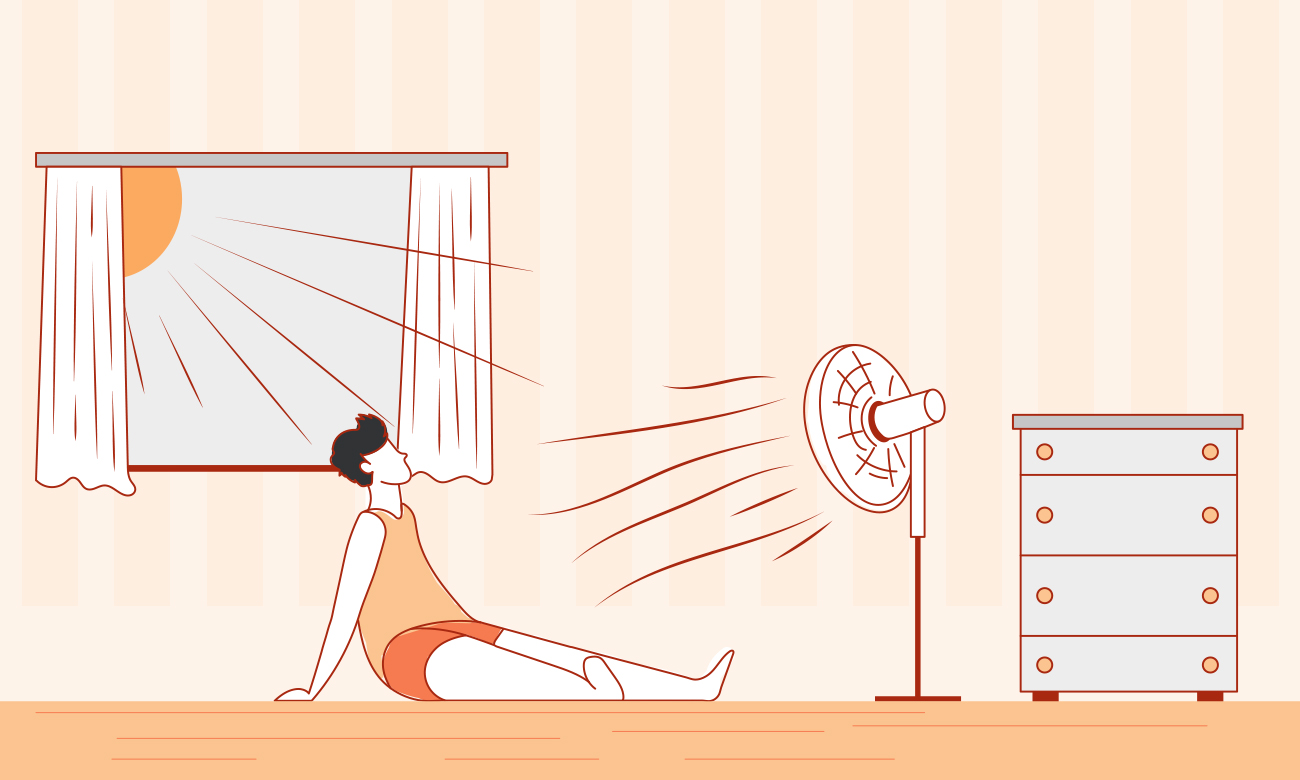Summertime vacations often conjure up images of sandy beaches and sun-soaked cityscapes.
Yet—
As global temperatures climb to record highs, the sizzle might be more than many bargained for.
So, at Passport Photo Online, we’ve decided to poll 1,000+ Americans and explore how heat waves could reshape the travel landscape.
Let’s dig in:
Key Takeaways
- Nearly 94% of travelers have observed a change in the frequency or intensity of heat waves in recent years.
- Over 77% of Americans are likely or very likely to consider potential heat waves when planning future travel.
- Reshuffling daily schedules (27.15%), opting for stays with better cooling facilities (26.56%), and changing transportation methods (25.84%) are the key adjustments tourists make in response to heat waves.
- About 48% of respondents cite health issues such as dehydration or exhaustion as their top inconvenience during heat waves.
- Over 57% of globetrotters would consider getting travel insurance that specifically covers disruptions from heat waves.
- Headache (28%) is the most prominently experienced heat-related symptom.
- Respondents’ top three heat wave precautions are staying hydrated (14.71%), avoiding outdoor activities during midday (14.11%), and using sun protection with appropriate clothing (13.88%).
Most Travelers Will Now Factor in the Heat
The world’s thermostat is going haywire.
Phoenix recently endured 31 relentless days of temperatures soaring beyond 110 ℉ (~43.3 °C).
A handful of Italy’s cities flashed extreme weather alerts, and South Korea’s World Scout Jamboree saw over 125 heat-induced hospitalizations.
So—
When we asked survey respondents if they’d noticed an uptick in the frequency or intensity of heat waves in recent years, we weren’t surprised when nearly 94% said, “Yes.”
Have a look:
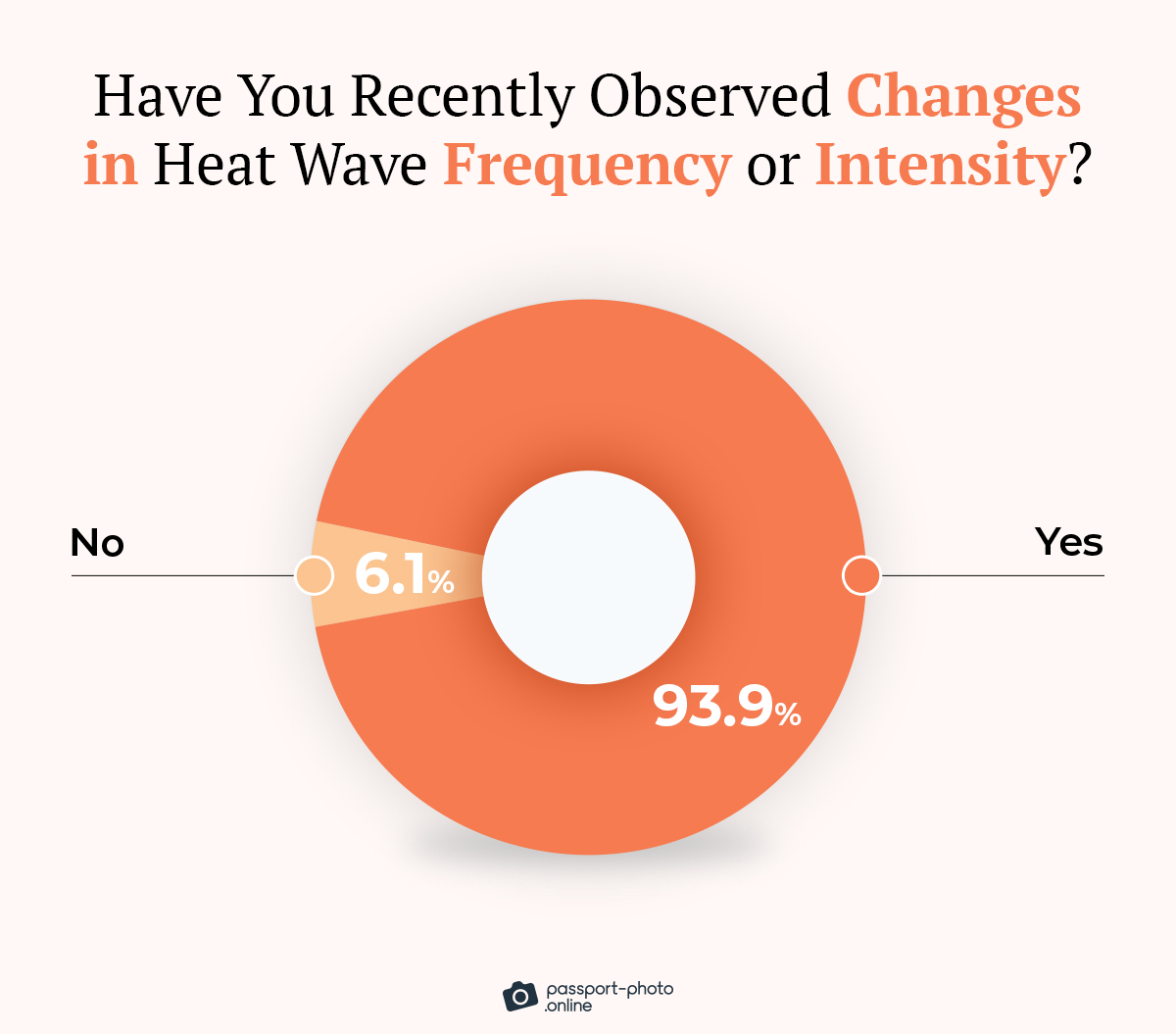
Now, experts say this intense heat isn’t an anomaly but a preview of what’s to come.
That’s why we also wanted to see if Americans will now consider potential heat waves when planning travel.
Below are the results:
| How Likely Are You to Consider Potential Heat Waves When Planning Future Leisure Travel? | Share |
|---|---|
| Likely | 52.63% |
| Very likely | 25.24% |
| Neutral | 13.64% |
| Very unlikely | 4.31% |
| Unlikely | 4.19% |
The data shows that over 77% of travelers will factor in the heat.
Indeed:
European Travel Commission (ETC) says there’s already a 10% drop in those planning trips to the Mediterranean from June to November compared last year.
Plus, countries with milder climates, like the Czech Republic, Denmark, Ireland, and Bulgaria, are experiencing a surge in tourist arrivals.
So—
This could mean we’ll see more and more travelers interested in cooler places during summer.
But that’s not all.
Here are other ways tourists might work around high temperatures:
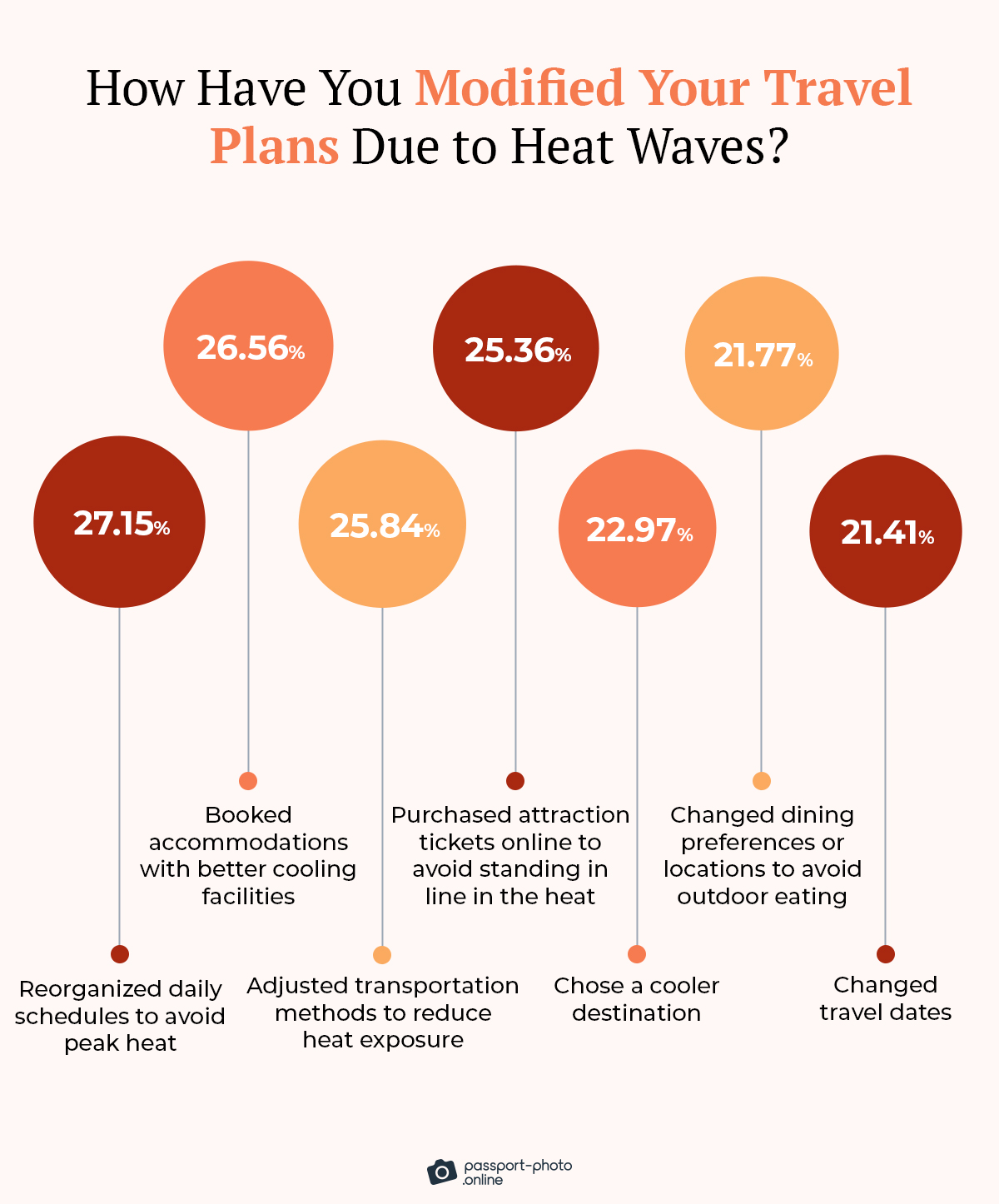
The most commonly mentioned tweak is reorganizing daily schedules, with 27.15% of the vote.
It’s followed by prioritizing stays that promise better cooling facilities (26.56%) and adjusting transportation options to sidestep the blaze (25.84%).
Travel providers, take note!

Do you need passport photos? Find out more:
Dehydration/Exhaustion Are the Biggest Hurdles of Heat-Wave Travel
Did you know?
Mabrian, a travel intelligence company, developed Climate Perception Index.
It gauges tourist satisfaction with the weather at their destination using data from millions of daily social media interactions.
They found that in instances where people endured a heat wave, there was a noticeable dip in overall trip enjoyment.
So—
From our end, we wanted to quiz Americans who had sweated through a heat wave about the biggest hurdles they faced to better understand the root of the unhappiness.
Below are the results:
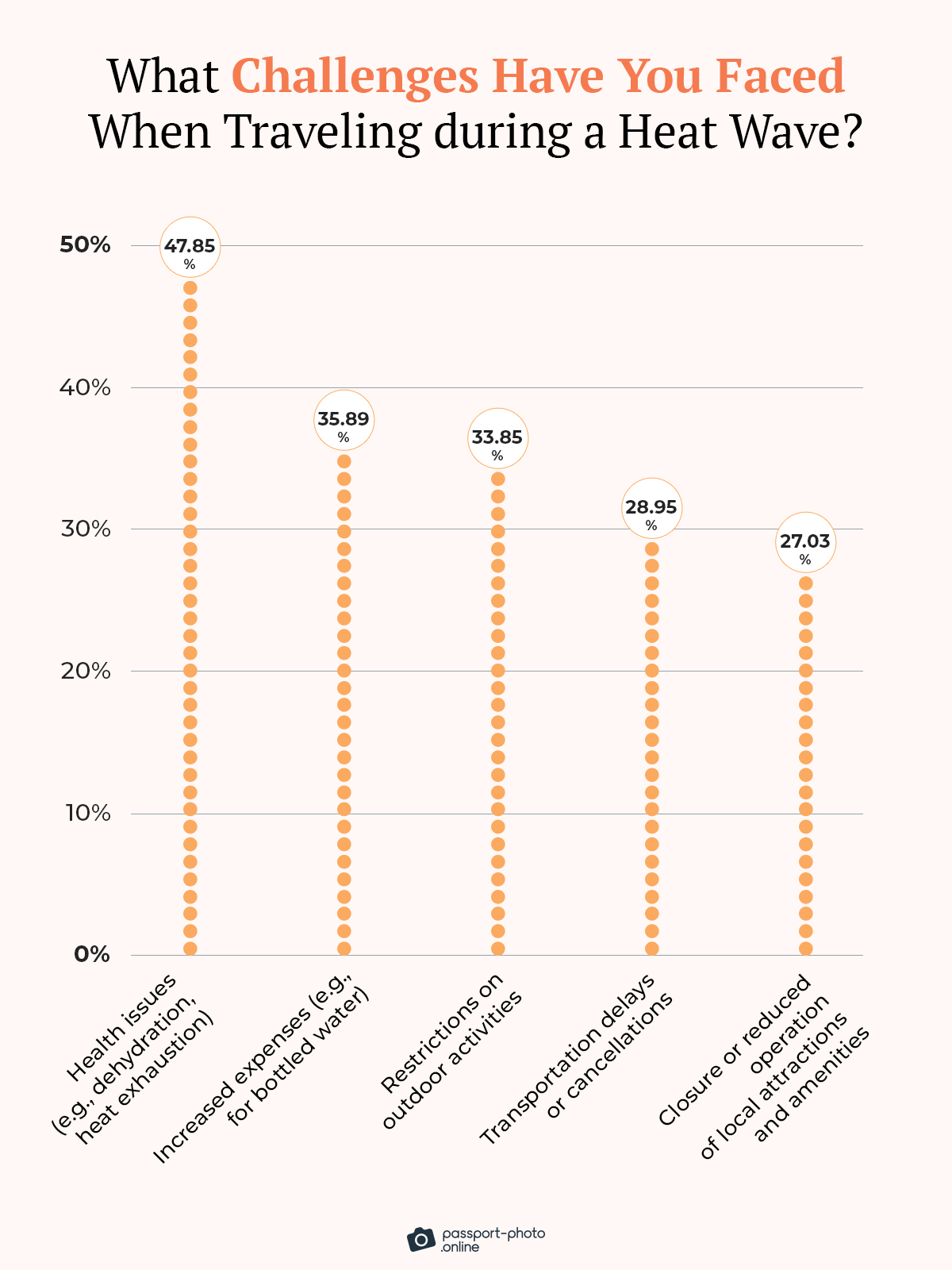
As you can see, it’s not just about packing an extra bottle of sunscreen.
The risk of dehydration or heat exhaustion (48%) is real and can mar the experience.
Plus, other practical issues like curtailed outdoor activities (34%) or transportation hiccups (29%) could add to these struggles.
As a follow-up, we asked respondents if they’d consider getting travel insurance that specifically covers disruptions from heat waves.
Here’s what we found:
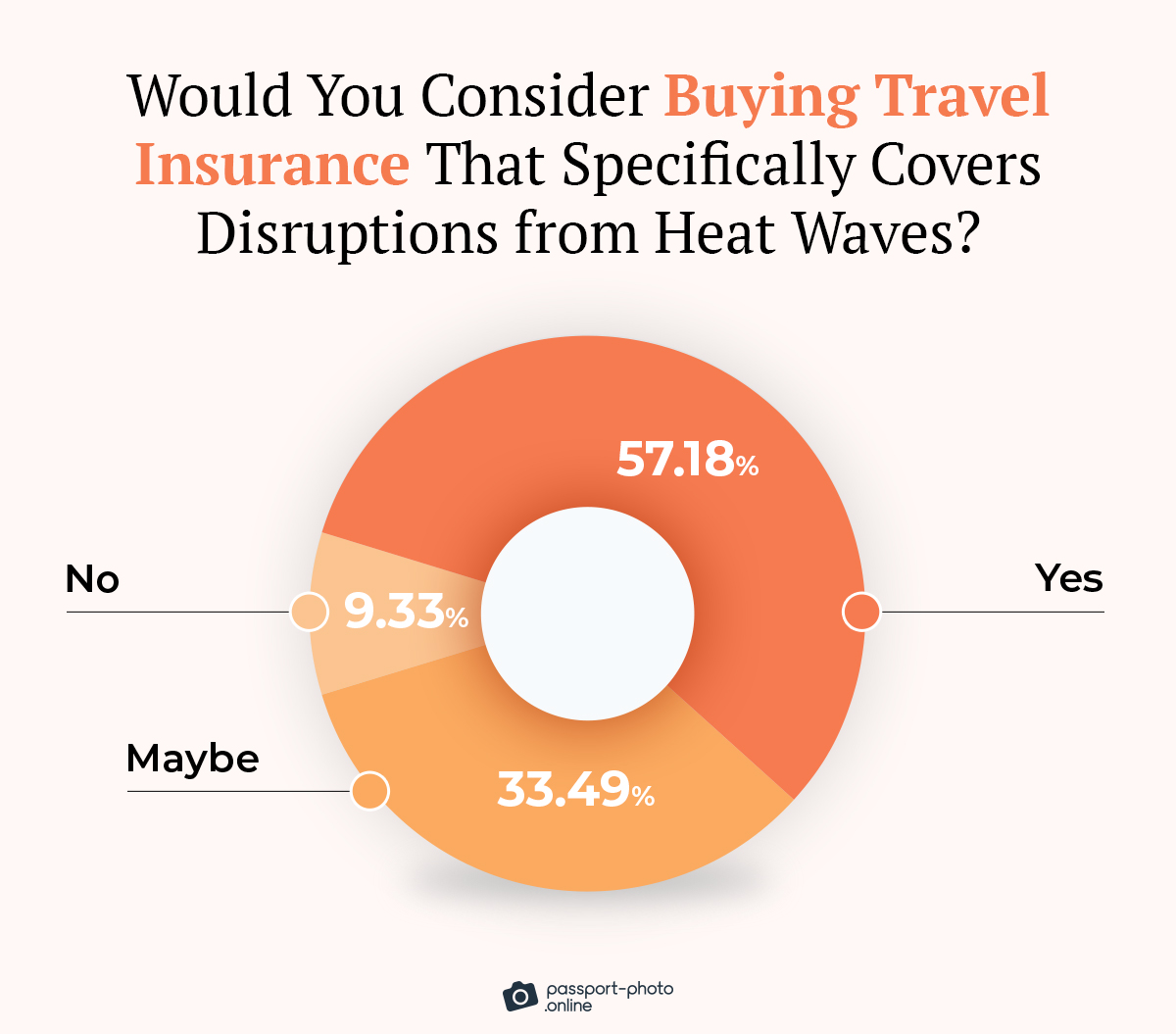
A resounding 57% said “Yes.”
This further goes to show how attuned travelers are becoming to the challenges posed by unpredictable weather phenomena.
Sip Smart in the Sun: The #1 Tip for Beating the Blaze
Here’s a not-so-fun part:
Besides the above inconveniences, extreme heat can cause serious medical issues or even death.
In fact, CDC reports that over 700 people die from extreme heat annually in the US alone.
Given the staggering figures, we were compelled to ask survey respondents about the symptoms they experienced when the sun beat down too hard.
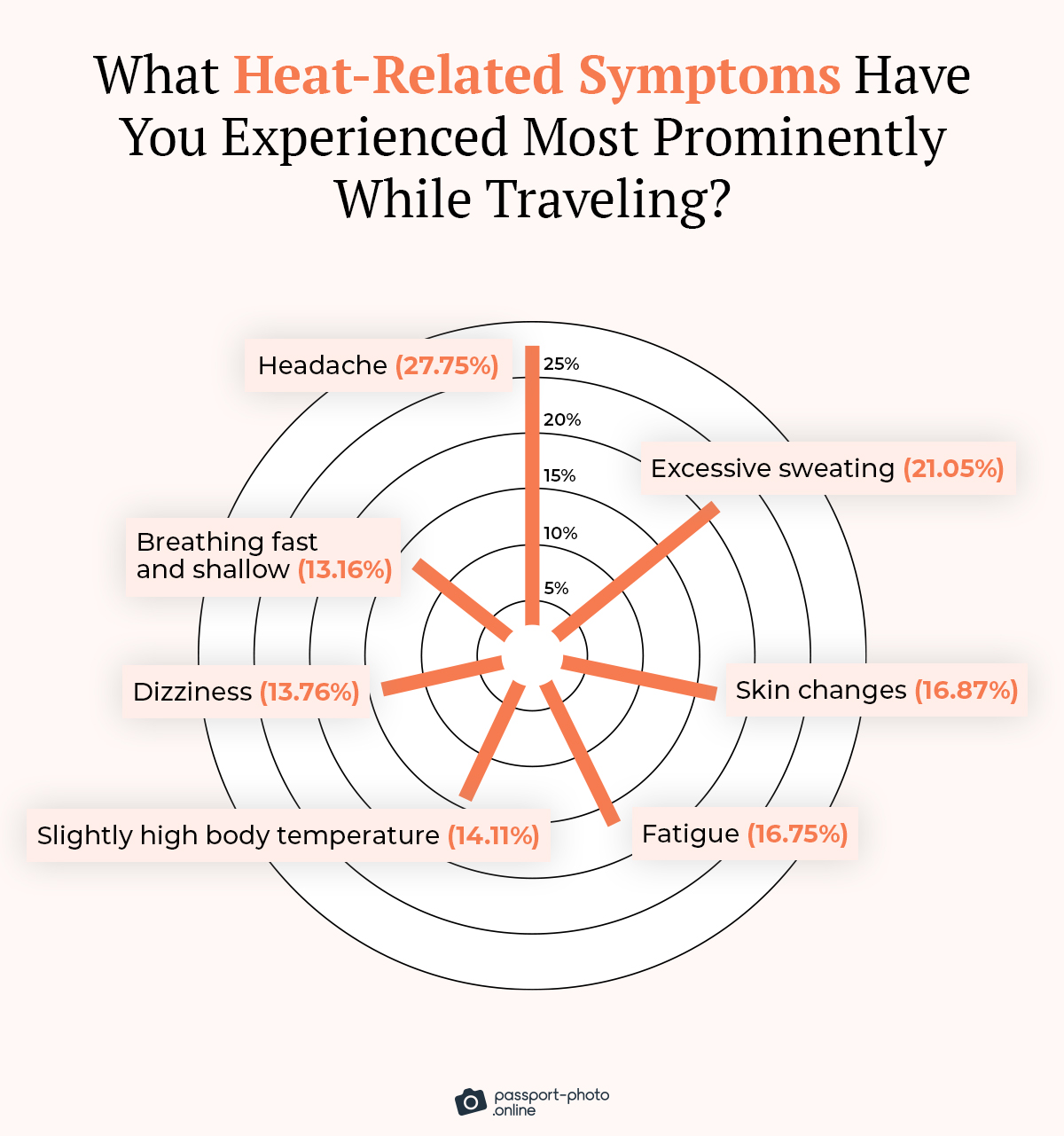
As you can see, travelers can experience a range of symptoms, with headaches (28%) being the most common.
Now—
While some symptoms may seem minor, they can compound and lead to more severe outcomes.
In fact, more than 23% of respondents later said they had to go to a hospital/clinic to treat heat-related illnesses.
Take a look:
| Did You Seek Any Medical Assistance Due to Heat-Related Illnesses during Your Travel? | Share |
|---|---|
| Yes, I bought over-the-counter medicine | 25.24% |
| Yes, I consulted a medical professional without visiting a hospital or clinic | 25% |
| Yes, I went to a hospital/clinic | 23.33% |
| No, but I felt unwell due to the heat | 15.31% |
| No, I didn’t experience any heat-related illnesses | 11.12% |
Clearly, it pays to be prepared when temperatures rise.
So—
We gave survey takers a list of preventative measures and asked them to pick the one they’d recommend to fellow globetrotters.
The winner?
Staying hydrated and avoiding alcohol/caffeinated drinks, with 14.71% of the vote.
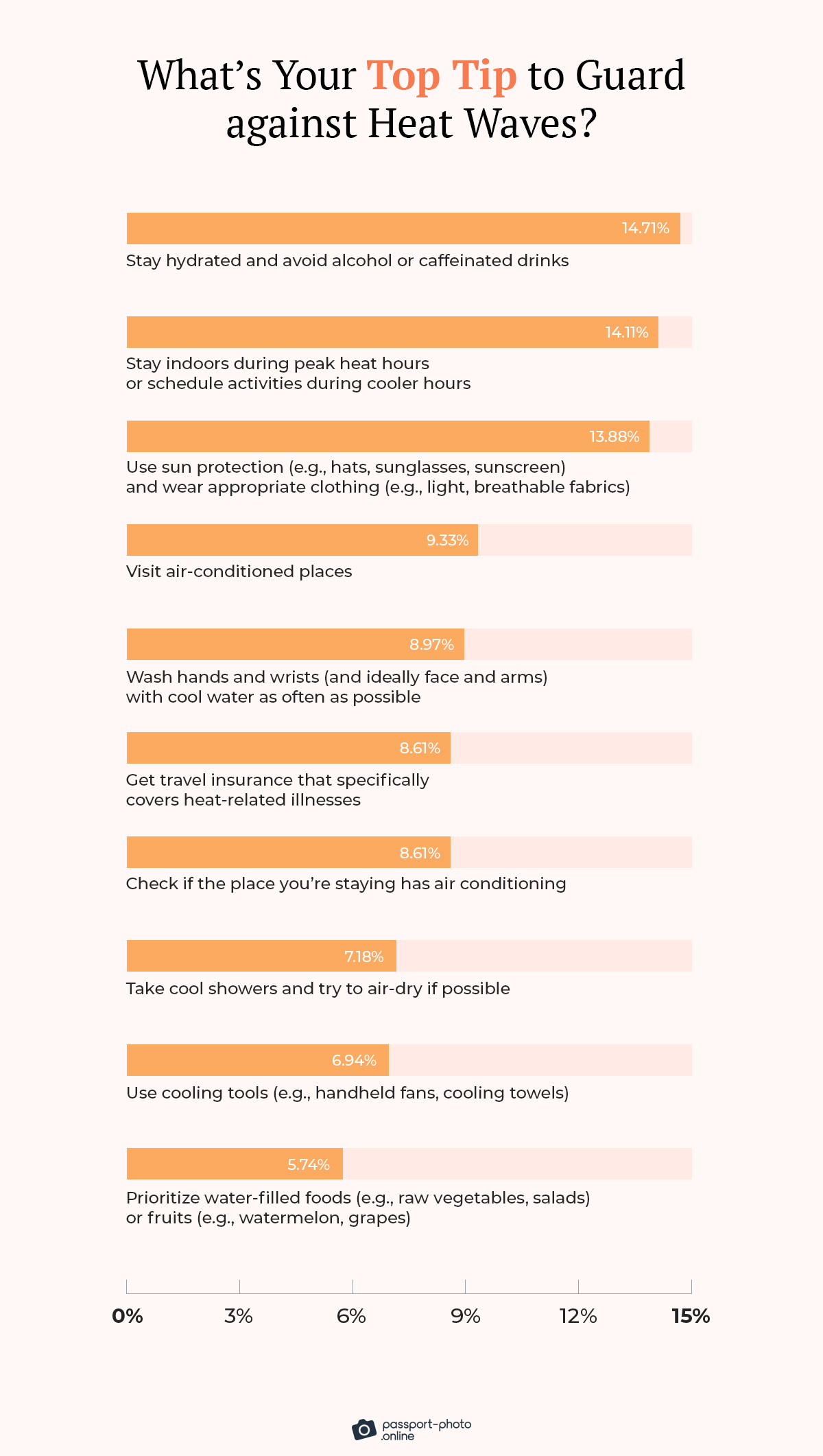
The next two recommendations are being strategic with outdoor time (14.11%) and using protective accessories and clothing (13.88%).
Now—
With this knowledge, we hope you’ll stay safe even when the mercury spikes!
Stacking It All Up
There you have it.
A comprehensive look at how heat waves could be changing tourism.
If you believe your audience will be interested in this information, feel free to share it. Just remember to mention the source and link back to this page.
Methodology
We conducted an online survey of 1,004 US respondents who had traveled for leisure in the last three years and were primarily or jointly responsible for travel planning and decision-making via a bespoke online polling tool in August 2023.
The respondents were 50.6% male, 48.7% female, and 0.7% identified as other. 34.6% of respondents were 26 or younger, 45.2% were aged 27–42, 15.4% were aged 43–58, and 4.8% were 59 or older.
This survey has a confidence level of 95% and a margin of error of 3%. Given the gender and age makeup of our sample size, the study’s findings are statistically significant for the population at large.
This study was created through multiple research steps, crowdsourcing, and surveying. Data scientists reviewed all survey participants’ responses for quality control. The survey also had an attention-check question.
Sources
- Axios, “Climate Change Upends Summer Travel”
- CDC, “Warning Signs and Symptoms of Heat-Related Illness”
- CNN, “Traveling to a Heat Wave Zone: Here’s What Tourists Need To Know”
- DIR, “Heat Illness Prevention | What Is Heat Illness?”
- Mabrian, “How Can Heat Waves Shape Future Travel Trends?”
- NBC News, “Europe’s Heat Wave Shows How Climate Change Could Change Tourism”
- Reuters, “Europe’s Sweltering Summer Could Send Tourists to Cooler Climes”
- The New York Times, “As Heat Waves Descend on Europe, So Do Tourists”
- The New York Times, “Europe’s Sweltering Summer Could Send Tourists to Cooler Climes”
- The New York Times, “Stockholm Instead of Rome? October Instead of July? How Heat Waves Are Changing Tourism in Europe”
- The Seattle Times, “Extreme Weather Is Changing Tourism, and the Travel Industry Isn’t Ready”
- The Straits Times, “Extreme Weather Is Changing Europe’s Tourism and the Travel Industry Isn’t Ready”

As a Digital PR specialist and a member of the Society of Professional Journalists (SPJ), Max has 5+ years of writing experience.
Over the course of his career, Max’s work has garnered significant attention, with features in numerous prominent publications such as The New York Times, Forbes, Inc., Business Insider, Fast Company, Entrepreneur, BBC, TechRepublic, Glassdoor, and G2.
